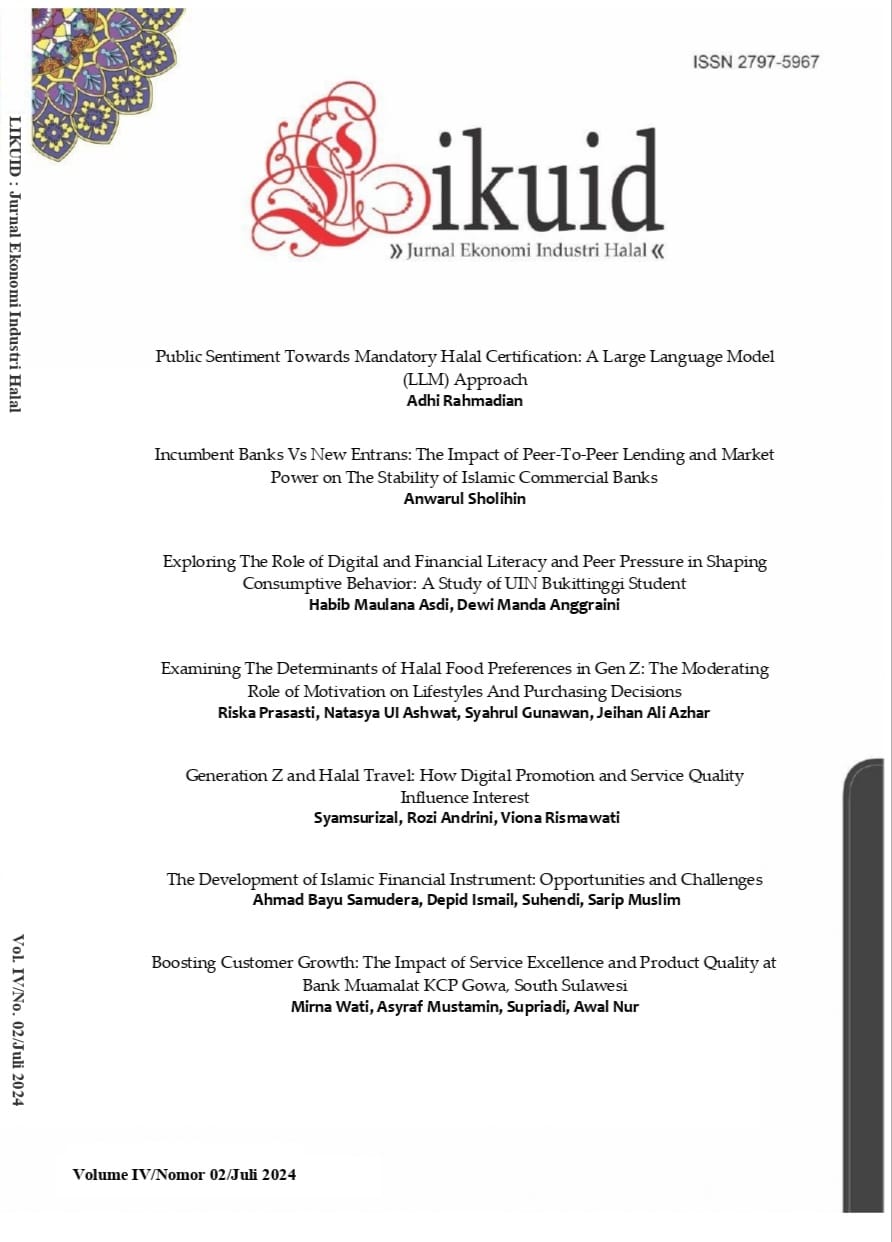Public Sentiment Towards Mandatory Halal Certification: A Large Language Model (LLM) Approach
DOI:
https://doi.org/10.15575/likuid.v4i2.35185Keywords:
Halal Certification, Sentiment Analysis, Large Language Model, Data ScienceAbstract
References
Abu Talib, M.S., Hamid, A.B.A. and Zulfakar, M.H. (2017), "Halal supply chain critical success factors: a literature review", Journal of Islamic Marketing, 8(3), 558-577.
Ainin, S., Feizollah, A., Anuar, N. B., Abdullah, N. A., & Sahran, M. N. F. (2020). Examining what people tweet in relation to halal cosmetic-related topics. Cogent Arts & Humanities, 7(1), 1724593.
Ajzen, I. (1991). The theory of planned behavior. Organizational Behavior and Human Decision Processes, 50(2), 179-211.
Alam, M. M., Ezzat, S., & Hussain, S. (2021). Public sentiment analysis on halal food certification: A study using social media data. Journal of Islamic Marketing, 12(4), 855-871.
Annabi, C. A., & Ibidapo-Obe, O. O. (2017). Halal certification organizations in the United Kingdom: An exploration of halal cosmetic certification. Journal of Islamic Marketing, 8(1), 1-18.
Basri, W. and Kurniawati, M.A. (2019), Effect of halal tourism destination image on tourist satisfaction. Journal of Environmental Management and Tourism, 10(8), 1801-1813.
Barney, J. (1991). Firm resources and sustained competitive advantage. Journal of Management, 17(1), 99-120.
Brown, T. B., Mann, B., Ryder, N., Subbiah, M., Kaplan, J., Dhariwal, P., Neelakantan, A., Shyam, P., Sastry, G., Askell, A., Agarwal, S., Herbert-Voss, A., Krueger, G., Henighan, T., Child, R., Ramesh, A., Ziegler, D. M., Wu, J., Winter, C., ... Amodei, D. (2020). Language models are few-shot learners. arXiv. https://arxiv.org/abs/2005.14165
Charity, M. L. (2017). Jaminan produk halal di indonesia (halal products guarantee in Indonesia). Jurnal Legislasi Indonesia, 14(1), 99-108.
Dehaff, M. (2010). Sentiment analysis, hard but worth it! CustomerThink. http://www.customerthink.com/blog/sentiment_analysis_hard_but_worth_it
Faridah, H. D. (2024). Sertifikasi halal di Indonesia: Sejarah, perkembangan, dan implementasi. Journal of Halal Product and Research, 6(1), 68-82.
Grand View Research. (2024). Global halal food market size worth $2.04 trillion by 2030. https://www.grandviewresearch.com/press-release/global-halal-food-market
Hota, H. S., Sharma, D. K., & Verma, N. (2021). Lexicon-based sentiment analysis using Twitter data: A case of COVID-19 outbreak in India and abroad. In Data Science for COVID-19, 275-295.
Indonesia, Pemerintah Pusat. (2021). Peraturan Pemerintah (PP) Nomor 39 Tahun 2021 tentang Penyelenggaraan Jaminan Produk Halal. LN.2021/No.49, TLN No.6651.
Kaul, K., & Sharma, A. (2023). Unlocking the power of large language models in sentiment analysis for customer support. SearchUnify. https://www.searchunify.com/sudo-technical-blogs/unlocking-the-power-of-large-language-models-in-sentiment-analysis-for-customer-support/
Kementerian Koordinator Bidang Perekonomian Republik Indonesia. (2024). Dorong percepatan proses sertifikasi halal, pemerintah perluas kewenangan penetapan kehalalan produk. In Siaran Pers HM.4.6/317/SET.M.EKON.3/05/2024.
Mastercard-CrescentRating. (2019), Global Muslim Travel Index 2019, Mastercard-CrescentRating, Singapore.
Mostafa, M. M. (2020). A sentiment analysis of consumers' online reviews of halal food products using machine learning techniques. Journal of Food Products Marketing, 26(4), 272-286.
Muhamed, N.A., Ramli, N.M., Aziz, S.A. and Yaakub, N.A. (2019), Integrating halal assurance system and total quality management in Malaysian halal food companies, International Journal of Supply Chain Management, 8(4), 1010-1019.
Pohan, Z. (2024). Menumbuhkan kesadaran dan pengetahuan hukum akselerasi produk halal untuk meningkatkan kesejahteraan masyarakat. Mediation: Journal of Law, 3(1), 1-15.
Radford, A., Wu, J., Child, R., Luan, D., Amodei, D., & Sutskever, I. (2019). Language models are unsupervised multitask learners. OpenAI. https://openai.com/research/language-models
Rahmawati, R., Thamrin, H., & Putra, Z. N. T. (2022). Overview industri halal di perdagangan global. SYARIKAT: Jurnal Rumpun Ekonomi Syariah, 5(2), 1-15.
Rusydiana, A. S. (2018). Sentiment analysis of Islamic waqf: Evidence in Indonesia. Maqdis: Jurnal Kajian Ekonomi Islam, 3(2), 123-134.
Rusydiana, A. S., Firmansyah, I., & Marlina, L. (2018). Sentiment analysis of microtakaful industry: Comparison of Indonesia and Malaysia. International Journal of Nusantara Islam, 6(1), 20-34.
Rozaidah, S., Idris. (2024). Navigating halal certification challenges in japanese restaurants: insights and strategies for success. Journal of Halal Science, Industry, and Business, 2(1), 1-10.
Salindal, N.A. (2019). Halal certification compliance and its effects on companies' innovative and market performance. Journal of Islamic Marketing, 10(2), 589-605.
Spence, M. (1973). Job market signaling. The Quarterly Journal of Economics, 87(3), 355-374.
Statista. (2024). Muslim population worldwide in 2023, by region. https://www.statista.com/statistics/736995/muslim-population-worldwide-by-region/
Tieman, M., van der Vorst, J. G., & Che Ghazali, M. (2012). Principles in halal supply chain management. Journal of Islamic Marketing, 3(3), 217-243.
Tieman, M. and Ghazali, M.C. (2014). Halal control activities and assurance activities in halal food logistics. Procedia-Social and Behavioral Sciences, 121, 44-57.
Undang-Undang Republik Indonesia Nomor 33 Tahun 2014 Tentang Jaminan Produk Halal. (2014).
Wilson, J. A., & Liu, J. (2020). Shaping the Halal into a brand?. Journal of Islamic Marketing, 11(2), 281-297.
Wongso, W. (2023). indonesian-roberta-base-sentiment-classifier (Revision e402e46). Hugging Face. https://huggingface.co/w11wo/indonesian-roberta-base-sentiment-classifier
Yulia, L. (2015). Strategi pengembangan industri produk halal. Jurnal Bimas Islam, 8(1), 1-15.
Yusuf, A. H., Shukor, S. A., & Bustamam, U. S. A. (2016). Halal certification vs business growth of food industry in Malaysia. Journal of Economics, Business and Management, 4(3), 247-251.
Verbeke, W., Rutsaert, P., Bonne, K. and Vermeir, I. (2013). Credence quality coordination and consumers' willingness-to-pay for certified halal labelled meat. Meat Science, 95(4), 790-797.











